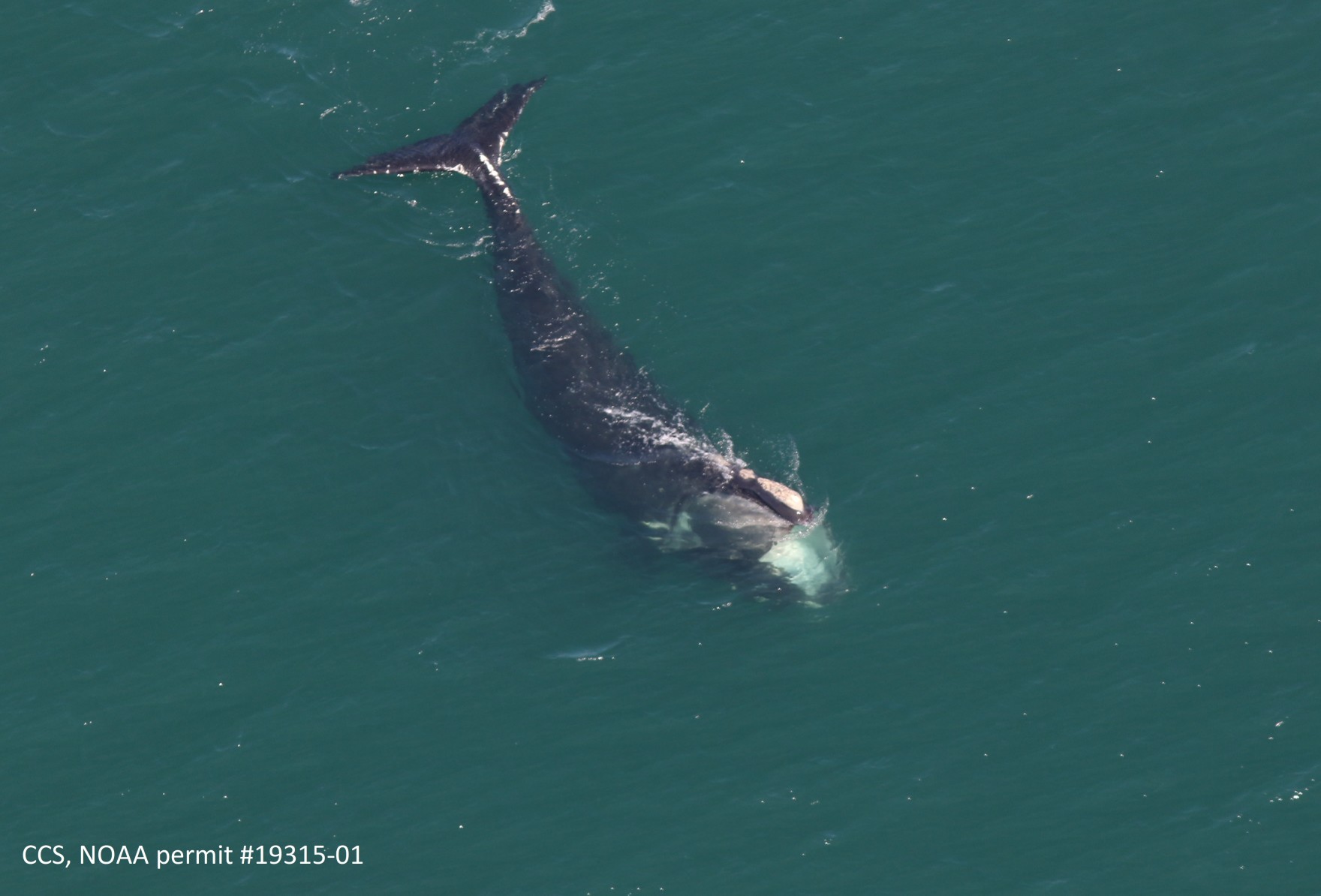Local right whale advocates say they feel sidelined by the powerful Maine lobster industry

Garlic, a juvenile North Atlantic right whale, is spotted by an aerial survey team north of Plymouth Bay on April 22, 2018. (Center for Coastal Studies)
As Maine’s lobstermen fight national conservation groups over federal gear rules and fishery closures intended to protect endangered whales, they have found fierce allies among the state’s political leaders. That’s left some local advocates for the whales feeling sidelined by the powerful industry.
A few weeks ago, lobstermen joined lawmakers to support a bill that would give nearly a million dollars directly to the industry for its legal battles over whale protection measures.
None of Maine’s more well-known conservation groups weighed in, but a handful of local advocates for the planet’s estimated 340 North Atlantic right whales testified against it.
Holly Travers, a Westbrook retiree, was interrupted by Rep. James Thorne of Carmel while testifying that “Maine has the highest concentration of all vertical gear in U.S. waters, and whales travel through Maine waters.”
Travers was directed to focus her comments narrowly on the bill. The third opponent to receive such a caution, she quickly wrapped up her testimony.
She said she was taken aback by her treatment.
“Why have a public hearing if you’re not open to all points of view? You would think that would be the goal of it. But I think not in this case; everyone seemed to be lined up in a certain way. I think when that happens you don’t get at the truth,” Travers said.
Two women lodged complaints with House Speaker Ryan Fecteau. A spokeswoman said he reviewed the issue and the points of order were in order. But the event highlights the way whale advocates can feel crowded out of the debate in Maine.
“It is really frustrating to be a small voice against a massive wave of the lobster industry. It’s difficult to be heard in those circumstances, and it’s difficult to be taken seriously,” said Sean Todd, a whale biologist and director of Allied Whale, a research group at Bar Harbor’s College of the Atlantic, whose mission includes rescuing injured marine mammals.
Back in the 1990s Todd worked on a successful collaboration between fishermen and scientists in Newfoundland, to protect then-endangered Humpback whales from entanglements.
“It’s been much more adversarial in the United States example versus the Canadian model. And that’s just a shame… It’s tragic,” Todd said.
Todd said the tone of Maine’s conversations about whales took a sharply antagonistic turn around 2015, when after decades of stability, the North Atlantic right whales’ numbers started to plummet. National conservation groups ramped up legal pressure on federal regulators to speed up new protections.
And the timing coincided with the presidency of Donald Trump and an accelerated polarization of U.S. political discourse.
“To some extent the fishing industry has taken on a little bit of that as well, and they have become very polarized. They are not listening any more, and that is a problem,” Todd said.
Todd is one of about a dozen whale advocates called the Maine Coalition for North Atlantic right whales. They say that they support Maine’s lobster industry, and believe it can change practices, stay in business and keep the right whales safe. Todd said Maine lobstermen could play a decisive and celebrated role in an eventual story of species’ recovery
But in the past couple of years the group’s members say, they’ve had to spend a good deal of their effort combating what they see as myths and half-truths about right whales – for instance, the idea that there hasn’t been a whale entangled in Maine lobster gear in almost two decades.
Such statements are being made by lobstermen, lawmakers, and Maine political leaders.
Read the rest of this story and hear the audio version at MainePublic.org.
